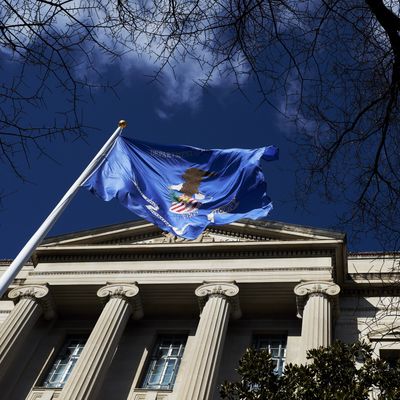
Over the Labor Day weekend, official Washington staged a celebration of itself through the funeral of John McCain. The insularity on display somewhat understandably enrages critics on the left and right alike. In their treatment of President Trump as a boorish outlier, and a unique personal threat to the health of the Republic, the elites either revealed their implicit conspiracy against the president (according to populists of the right) or their own insularity (according to the populists of the left).
It is certainly true that the bipartisan resistance centered around McCain has registered more self-satisfaction than actual resistance. Still, on the same weekend official Washington was treating Trump as an outcast, Trump was demonstrating what he has done to earn this status. In a revealing weekend tweet, he castigated his attorney general, Jeff Sessions, for allowing the Justice Department to indict a pair of House Republicans.
Trump’s latest declaration of corrupt intent puts a fine point on the question both groups of skeptics have tended to avoid. Right-wing Trump allies have defended his assault on the Department of Justice by picking apart the FBI’s counterintelligence investigation, adopting (for the narrow purposes of defending Trump) a radically pro-civil-libertarian view of FISA warrants, or demanding to know why Trump’s subordinates are being charged with crimes other than collusion with Russia. On the left, some critics have mocked the idea that there is anything worthwhile in the bipartisan defense of democratic norms against Trump.
But Trump’s intention to politicize the Department of Justice frames in sharp detail the question they have largely elided. However one feels about the general merits of the Washington Establishment, here is a threat to a specific governing norm whose value is beyond dispute. Trump objects to the indictments of two House Republicans who have been caught in blatant illegality. Representative Chris Collins, the first House Republican to endorse him, was overheard boasting about making colleagues rich with his inside information. Representative Duncan Hunter not only systematically misappropriated public funds but was recorded in a series of damning emails. These are not marginal cases. Trump’s entire rationale for opposing the prosecutions is that they hurt his party.
And Trump has been repeatedly clear about his objective. He regularly demands that his attorney general protect his personal interests and open investigations into figures he dislikes. Trump tried to sell Sessions on the prospect that he would become a “hero” to the Republican base by locking up Hillary Clinton, and then berated him when he failed to do so. Trump’s lawyers have written a memo defending his prerogative to do so. “The President not only has unfettered statutory and Constitutional authority to terminate the FBI Director,” they argued, “he also has Constitutional authority to direct the Justice Department to open or close an investigation, and, of course, the power to pardon any person before, during, or after an investigation and/or conviction.”
Regardless of the law, there is nobody actually willing to defend such an arrangement on normative grounds. A system in which a president can order up investigations of the opposing party and quash investigations of his own would hand incumbents a weapon so powerful it would make democracy a sham. Vladimir Putin has not needed to cancel elections in order to cement his authority. His most important tool has been selective law enforcement, which has allowed him to court allies with the promise of riches and legal impunity, and to intimidate his critics with with ruinous threats to their reputation, fortunes and freedoms.
A Wall Street Journal editorial earlier this year sneered, “we’re pleased to report that there hasn’t been a fascist coup in Washington.” It hasn’t been for lack of trying, or for lack of support from institutional Republican organs like the Journal. Indeed, despite a handful of criticisms, Republicans in Congress have largely refused to criticize Trump’s demands to control the DOJ.
Neither the law nor the Constitution can do much to stop Trump from fully corrupting the Justice Department. The only thing standing between American democracy and Trump’s vision of a Putin-like regime that terrorizes the opposition while nourishing an oligarchy of regime supporters is that much-mocked word: a norm. It is on this specific question, not some generalized cultural assessment of the Washington elite, that the struggle to defend democracy rests.






























